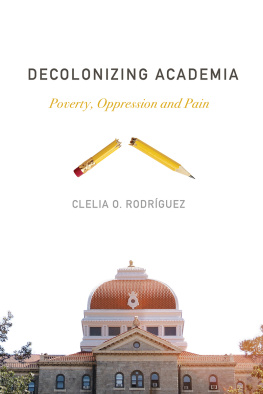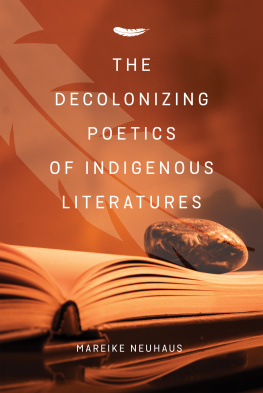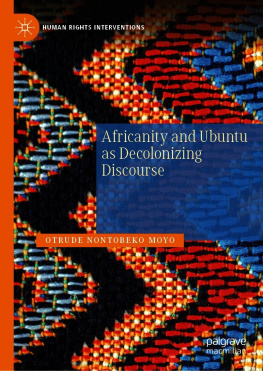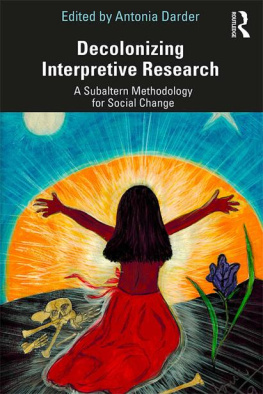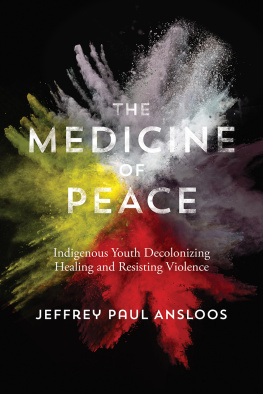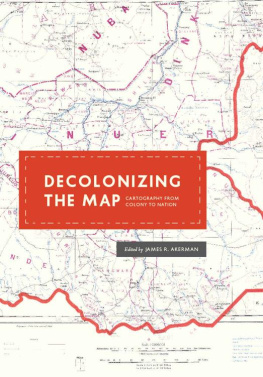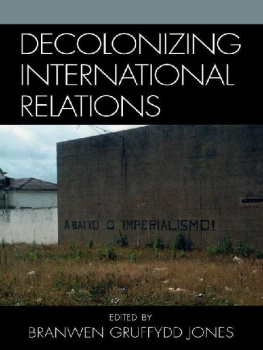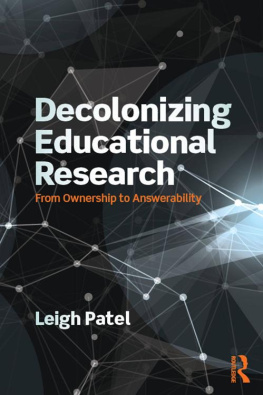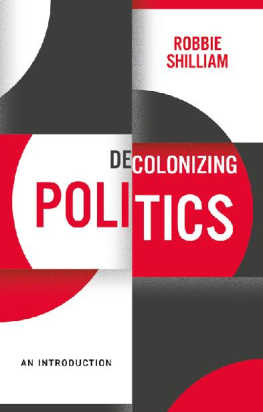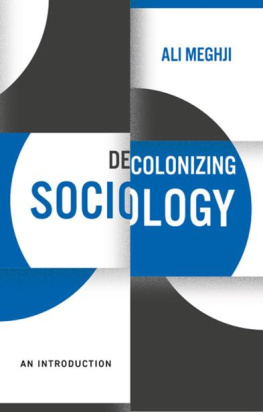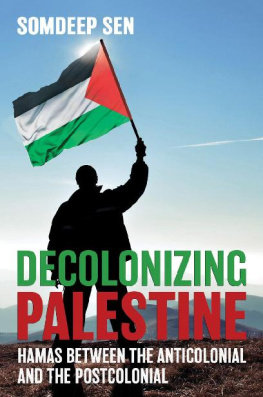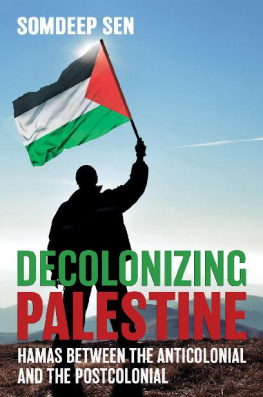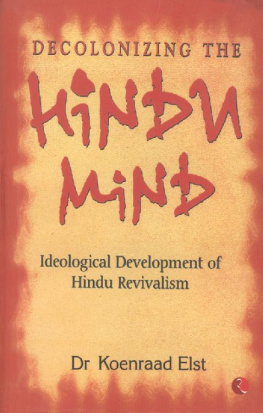DECOLONIZING ACADEMIA
DECOLONIZING ACADEMIA
Poverty, Oppression, and Pain
CLELIA O. RODRGUEZ
Fernwood Publishing
Halifax & Winnipeg
Copyright 2018 Clelia O. Rodrguez
All rights reserved. No part of this book may be reproduced or transmitted in any form by any means without permission in writing from the publisher, except by a reviewer, who may quote brief passages in a review.
Editing: Fazeela Jiwa
Text design: Brenda Conroy
Cover design: Tania Craan
Printed and bound in Canada
eBook: tikaebooks.com
Published by Fernwood Publishing
32 Oceanvista Lane, Black Point, Nova Scotia, B0J 1B0
and 748 Broadway Avenue, Winnipeg, Manitoba, R3G 0X3
www.fernwoodpublishing.ca
Fernwood Publishing Company Limited gratefully acknowledges the financial support of the Government of Canada, the Manitoba Department of Culture, Heritage and Tourism under the Manitoba Publishers Marketing Assistance Program and the Province of Manitoba, through the Book Publishing Tax Credit, for our publishing program. We are pleased to work in partnership with the Province of Nova Scotia to develop and promote our creative industries for the benefit of all Nova Scotians. We acknowledge the support of the Canada Council for the Arts, which last year invested $153 million to bring the arts to Canadians throughout the country.

Library and Archives Canada Cataloguing in Publication
Rodrguez, Clelia O., 1975-, author
Decolonizing academia : poverty, oppression and pain
/ Clelia O. Rodrguez.
Includes bibliographical references and index.
Issued in print and electronic formats.
ISBN 978-1-77363-074-8 (softcover).--ISBN 978-1-77363-075-5 (EPUB).--ISBN 978-1-77363-076-2 (Kindle
1. Racism in higher education. 2. Minorities in higher education. 3. Education, Higher--Social aspects. I. Title.
LC212.4.R63 2018 370.89 C2018-903709-1
C2018-904503-5
Contents
To my ancestors, your fire is alive.
To my grandparents, aunts, cousins, brother, nephew, husband, friends, students, teachers, mentors, mother, and daughter, your radical love has saved me.
To angry mujeres of colour everywhere.
Acknowledgements
Every word inscribed in this book comes from experiences I have lived, breathed, felt, imagined, inherited, seeded, sustained, birthed, dreamed, watered, fired, stepped on, painted, burned, and healed. This text is about many texts. Its a reading about many readings. Its writing about other forms of living writing.
My grandfather taught me how to read and write differently about time, patience, humility, water, ants, bees, trees, air, keys, land, respect, dignity, gratitude, love.
I thank turtles for their exemplary lessons on time. Id be lost in chronology if it wasnt for their ability to walk earth acknowledging their environment.
Thank you to peasants everywhere for labouring the land as their backs salute the sun daily. Their printed DNA on the food they encounter is never taken for granted at my table.
Thanks to bees for cross-pollinating wisdom as the minds of people of colour in classroom struggle everywhere to find the essence of nectar to share with their students.
I am grateful for the sanctuaries protected by the power of humility in a world where warriors like ants are crushed without acknowledging they even exist.
To the people of colour who wear their vulnerability to their unlearning sessions and the air that feeds their fire, Im eternally in debt. The commitment to dismantling systemic racism knowing were against the current is what radical love is made of.
I give thanks to vivid readers, like Fazeela Jiwa, editor of this book, whose eyes speak of a kindness that transgresses academic rules.
And to everyone who, while reading the text, realizes that oppression in academic settings must be not only challenged but changed, I say, do it!
Unlearning
Unlearning is the soul and centre of my decolonizing pedagogy. As a student of life, educator, mother, activist, angry pacifist, and instigator of inquisitorial thinking, I have not only burnt down colonial bridges but also agitated and organized students around the teachings of radical love. Professionalization, as it is commonly referred to in graduate school, tried to teach me to trust a system that is not thought or designed to liberate me. One of the gurus in the department told my new cohort of aspiring scholars to focus only on research, as teaching was not important at the university that had carefully selected us. We had been chosen to excel academically and to engage in boundless knowledge. I felt scolded. My throat was dried and my thirst for inquisitorial questions only magnified under the colonial telescope of the ivory tower. When I think back to that morning in early September 2005, I think of food processors: a couple of brains waiting in line to be shredded into chewable, tiny pieces. The norm, then and now, is to produce cutting-edge knowledge in the name of academic freedom, which seems to be tied to a mathematical convention taken out of one of George Orwells ubiquitous nightmares: 2+2=5. This equation highlights whats hidden behind superficial attempts to flatten the vertical censorship at the heart of accruing financial power. The belief is that, as academics in the making, we strive to adopt writing norms and mimic behaviours to become the right fit for the future institution that will glorify us by nurturing our careers as long as our experiences as coloured people do not interfere with agendas and mission statements that $ell buzzword$ to attract $tudent$.
This imagined life is painful. My cinnamon skin knows it. My twisted and wicked tongue has wounds to prove it. The presumed superiority performed in academia drills through the anatomy of learning that should take place in the classroom. This racial battle fatigue, as William Smith points out, is daily. Its operating 24/7. Motion sickness punctures my lungs, making them hang in a porous palm tree. It leads me to forget why education matters, to believe temporarily that slavery of the mind is comforting. The pain consoles me, complementing my cries as it exhausts my neck by forcing me to look down. So, why do white academics continue to flat-out deny our reality? This pain is similar to how my uterus screams every month.
This text is like peeling an onion. Removing layers is a process of untangling deadlines in the name of higher education, letting fluidity be the guiding light instead of a rigid process that suffocates the breathing pattern floating in my dreams. This is a book that acknowledges tension as part of an experimental exercise linked to decolonizing ways of expression. The form is yours to feel. The content is yours to create in a space framed by critical thinking. What you are in for is similar to a lesson I was given by my auntie Rosa when she taught me how to experience life among the dead:
Its | experimenting | with | the | salivating of hungry dogs | in | the | gut |
" | " | " | " | invasion of misunderstood red ants | " | " | " |
" | " | " | " | hashtag in a virtual human rights class | " | " | " |
" | " |

